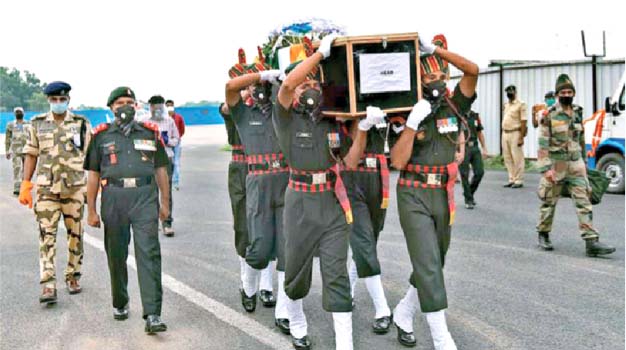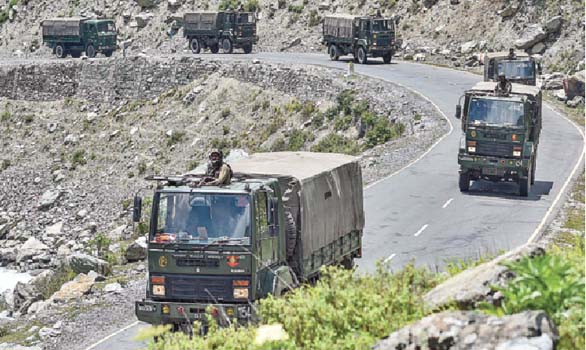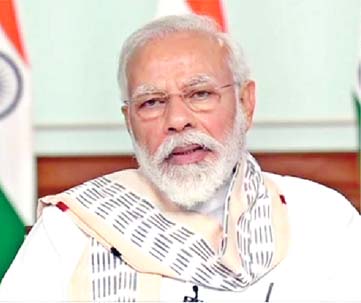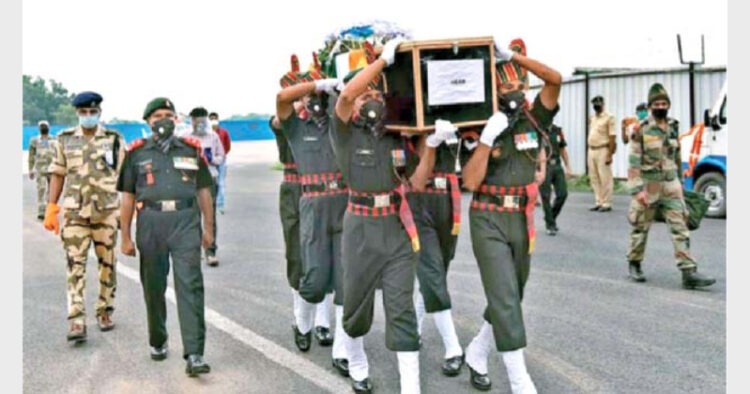The Galwan incident will become a defining moment in Sino-Indian relations. China had lost the plot and the dominant position. The Chinese pride has been shattered beyond repair, and the same goes for the Sino-Indian relations, which would take time to regain the old bonhomie

Army personnel carry the coffin of Hawaldar Sunil Kumar, who was one of the 20 jawans who were
killed during the face-off with the Chinese troops in Ladakh’s Galwan Valley, after a wreath-laying
ceremony at Jaiprakash Narayan Airport in Patna on June 17, 2020
killed during the face-off with the Chinese troops in Ladakh’s Galwan Valley, after a wreath-laying
ceremony at Jaiprakash Narayan Airport in Patna on June 17, 2020
The gory events that took place at icy heights at the Galwan valley stand-off point (PP 14) on the evening of June 15, 2020, and carried on late into the night has exposed the true colour of the Chinese Dragon. Claiming to be the most modernised Army prepared for combat in “Local Wars under Informationised Conditions”, the Chinese Army soldiers displayed barbaric tendencies of the Middle Age when throwing to wind all treaties and conventions, they attacked the unsuspecting Commanding Officer of an Indian unit with iron rods, Base Ball bats laced with spikes and barbed wires, gloves fitted with iron spikes and chains leading to a brawl of most unethical style resulting in heavy casualties on both sides. One thing is certain that the attack by the Chinese was unprovoked, pre-meditated and had the blessings of their superior commanders. It cannot be brushed off as a sudden rush of blood or ‘bravado’ by a local commander too much obsessed with the Chinese movie “Wolf Warrior”. It was a clear case of betrayal of faith by the Chinese after having agreed to a certain pullback as Confidence Building Measures (CBMs) as an overall plan of de-escalation leading towards the ultimate solution of the one-month-old stand-off between the two armies in Eastern Ladakh. What prompted the Chinese to resort to such treachery is a matter of conjectures but is definitely driven by its “Middle Kingdom” syndrome.
The devious Chinese mindset can be gauged from the contents of a late night article published in Global Times, the mouthpiece of Chinese Communist Party (CCP). “India has been building extensive infrastructure facilities along the border, and forcibly built part of the facilities in the Chinese side of the Line of Actual Control regardless of bilateral divergences over the border disputes. The two sides went into repeated physical clashes as Chinese soldiers tried to stop their Indian counterparts.”
A blatant lie since there has never been any dispute in the perception of LAC between the two armies in the Galwan Valley sector. The Chinese never in the past had crossed the LAC here. The Global Times version is an afterthought cover-up plan as it is at variance with the earlier statement issued by the spokesperson of the Western Theatre Command of the PLA. It would be pertinent to mention here that India is building a road up to PP14, which is well within its Territory.
The next paragraph of the article highlights Chinese anxiety and fear. It reads, “The arrogance and recklessness of the Indian side is the main reason for the consistent tensions along China-India borders. In recent years, New Delhi has adopted a tough stance on border issues, which is mainly resulted from two misjudgements. It believes that China does not want to sour relations with India because of increasing strategic pressure from the US; therefore, China lacks the will to hit back provocations from the Indian side. In addition, some Indian people mistakenly believe their country’s military is more powerful than China’s. This misrepresentations affect the rationality of Indian opinion and add pressure to India’s China policy.” The article is a display of the Chinese arrogance laced with its image of ‘neighbourhood bully’. The Chinese leadership believes in, “Who controls the past controls the future; who controls the present controls the past.” Xi Jinping is certainly acting towards the return to the Middle Kingdom era where China would sit atop all other sovereign states with no deference to their opinion except submission to the Dragon’s diktat. The global community has not forgotten how China bullied its way in the South China Sea despite international tribunal’s verdict to the contrary and has since declared a South China Sea District. A classic example of China’s cartographic aggression, a legacy of the Middle Kingdom.
China’s attempts in Ladakh are similar, a well-planned and coordinated cartographic invasion beginning with the forcible occupation of Aksai Chin in late fifties, retention of territories occupied in 1962, annexing Shaksgam Valley through an agreement with Pakistan and thereafter frequent forays into Ladakh to lay claim on the grazing grounds of local Mons. China is well-known for shifting stances mixing past and present with a motive for the future, throwing all bilateral agreements to the wind.
Putting together various threads available, it appears that as part of the agreement reached during the Corps Commander level meeting held on June 06, the Chinese troops opposite PP 14 were required to move further eastwards to their base called Post 1. It may be recalled that the Chinese have built two posts namely Post 2 and Post 1 along the bank of Galwan River after it takes a turn and runs almost parallel to the LAC well within the Chinese Territory before it enters India at PP 14. They have also built a road up to Post 1. The entire process was required to be completed within ten days ending June 15. The Chinese were to begin the thinning out since they had begun the build-up. The Indian CO, therefore along with a platoon strength, had gone to oversee the de-escalation process being the last day for the Chinese pull back. While the talks were going on, the Chinese soldiers in a pre-meditated move displayed their barbaric ancestry and attacked the CO with spiked rods and baseball bats. The following Indian troops rushed to the scene and hell broke loose thereafter. The brawl took an ugly turn. After the initial casualties, there was no backing down from either side. The scene of the clash was a steep narrow ledge with a deep ravine. Reinforcements arrived and the mayhem continued well into the night at those icy heights in the open. It was the Chinese side which not only broke all agreements, conventions and treaties. The behaviour of the Chinese troops was nothing but barbaric. China suffered a humiliating tactical defeat.
China’s attempts in Ladakh are similar, a well-planned and coordinated cartographic invasion beginning with the forcible occupation of Aksai Chin in late fifties, retention of territories occupied in 1962, annexing Shaksgam Valley through an agreement with Pakistan and thereafter frequent forays into Ladakh to lay claim on the grazing grounds of local Mons
But as was expected of the Chinese, they shifted the entire blame on the Indian side. The fact that the Chinese action was pre-meditated and had the blessings of the higher military commanders can be substantiated from the fact that the spokesperson of the Western Theatre Command issued a press note. It reads, “China always owns sovereignty over the Galwan Valley region, and the Indian border defence troops are inconsistent with their words and seriously violated the agreements both countries have reached, the consensus made during the army commander level talks and harmed the relations of the two militaries and the feelings of the two countries’ peoples. India should stop all provocative actions, meet the Chinese side halfway and come back to the right path of solving disputes through talks.”
A bundle of lies that smacks of arrogance. The typical superiority complex of ‘China can do no wrong.’ Compare this statement with the Global Times statement written above to draw your own conclusion on how China is trying to change the entire narrative by shifting the blame on India. But who will believe China except the sold-out Western media and its cultivated lobby in India? China is still looking for a face-saving strategy to get out of Wuhan virus blame when it has landed into another global embarrassment with a faulty notion of having embarrassed India.
Having received a bloody nose from India and after getting an unexpected response, China is now looking for a face-saving exit formula. Its treacherous attempt to shift the blame on Indian troops is finding no takers. Still, despite total control on media, it is finding it difficult to hide the large figure of fatal casualties. China has learnt though through a bitter lesson that its Army is not combat-ready and its soldiers are no match to battle-hardened Indian soldiers. Despite carrying the improvised lethal equipment, the Chinese were no match to the Indians in hand to hand combat. Despite starting the altercation and having suffered humiliation, China has started talking of peace, quite unlike the Chinese.

An Indian Army convoy moving along the Srinagar-Leh National Highway
China’s actions in Galwan have only reinforced what has always been known the world over since the Korean War, that their word can never be trusted and agreements are only a piece of paper. They are past master in twisting facts through bluff and blustery. Similarly, Chinese appeal for restraint and peace should not be taken at face value; it’s part of their psy cum information warfare. They are always conscious of their global image of a responsible and peace-loving state and would try to portray India as the aggressor.
Quoting the Global Times again, “China urges India to restraint its frontline troops and return to the avenue of talks. Chinese side treats the incident as an on-site conflict conducted only by frontline troops, and still see that dialogue is the ultimate approach to solving such issues.” It further reads, “The Indian leadership should also attain this kind of rationale, restrain aggressive forces and frontline officers within its military, and let the wisdom of both sides resolve this bloody conflict.” China has yet to see India’s aggression. It will have to pay for the unnecessary provocation leading to a bloody conflict and will no more be able to mislead the Indians through sweet talk and diplomatically laced statements.
Chinese, for once have crossed the red line and pushed back the efforts being made by the two sides at the political level to continue good relations despite the pending boundary issue. It has also made all the five treaties signed so far between the two nations to maintain peace and tranquillity on the border. China has been violating them frequently but never crossed the Rubicon. Fatal casualties have taken place for the first time since 1975 when a patrol clash took place in Arunachal Pradesh. If China thinks that it can dictate terms to India on border management and carry out bilateral trade on its terms because of perceived superior armed forces, it is sadly mistaken and has learnt a lesson the harder way.
China today, whose landmass consists of 60 per cent forcibly occupied territories has been bullying its neighbours to continue with its expansionist policies. So far, it had used restrain and not provoked India beyond a point. Though it had off and on being talking of the Tibet being its palm and Ladakh, Nepal, Sikkim, Bhutan and Arunachal Pradesh its fingers, it never dared to enforce its claim which is not only baseless but erratic. With the treachery done by China now, it can forget about the fingers and should prepare itself to lose the palm as well.

PM Narendra Modi observed a two-minute silence as a tribute to the soldiers who lost their lives in the recent stand-off with China and said that the sacrifice of soldiers will not go in vain
India does not want war but would not cede even an inch of Indian Territory, and China will have to begin pull back of its troops to the status as it existed before May 08. The kind of Indian response to the Chinese dare is a matter of speculation as of now, though the reports of Army being given a free hand have emerged from the South Block. Having secured a tactical victory, the Indian Army would be planning to ensure operational as well as strategic ascendancy over China.
Statements given by the Raksha Mantri and Pradhan Mantri are significant and self-explanatory. But one thing is certain that the Galwan incident will become a defining moment in Sino-Indian relations. China has lost the plot and the dominating position it has always been proud of. The Chinese pride has been shattered beyond repairs, and the same goes for the Sino-Indian relations, which would take time to regain the old bonhomie. India stands firmly with its armed forces. The whole world and especially the littoral states of the South China Sea are watching eagerly how India responds to the Big Bully.
(The write is a Jammu based veteran, political commentator, columnist, security and strategic analyst. Views expressed are entirely are personal)













Comments